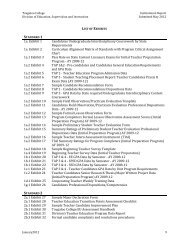Student Handbook - Tougaloo College
Student Handbook - Tougaloo College
Student Handbook - Tougaloo College
Create successful ePaper yourself
Turn your PDF publications into a flip-book with our unique Google optimized e-Paper software.
Parameters of the Judicial Council<br />
The Judiciary Council hears cases of violation by students of general college regulations, codes<br />
of conduct, or violations of specific policies set forth by the institution. These cases are referred<br />
to the Council by the Dean of <strong>Student</strong>s. Exceptions to be made by the President of the<br />
<strong>College</strong> or his/her designee, include cases of emergency as outlined below:<br />
1. Acts that endangers or seriously threaten the life or physical safety of others.<br />
2. Insubordination directed towards any administrator, faculty member, security officer,<br />
staff or resident assistant in the performance of his or her duties on or off campus.<br />
3. Damage to property.<br />
Cases with original jurisdiction to be heard by the Judicial Council are defined below:<br />
1. The interruption of the academic life of the <strong>College</strong>.<br />
2. Serious civil offense.<br />
3. Violation of codes of student conduct as set forth in this <strong>Handbook</strong>.<br />
The Judicial Council functions as follows:<br />
1. Summons shall be delivered by a representative of the Office of <strong>Student</strong> Affairs.<br />
2. All members shall act as interrogators. Any members of the Judiciary Council should<br />
disqualify himself/herself from sitting on a particular case in the event of involvement or<br />
close association.<br />
3. The accused student must be notified in writing of the specific charges made against<br />
him/her which shall include:<br />
a) the date, time and place of the hearing,<br />
b) adequate time for student to prepare his/her defense,<br />
c) the name(s) or office presenting the charge,<br />
d) the student must hear the specific charges brought by his/her accuser(s) in person<br />
or be presented with the charge in writing, signed by the accuser(s),<br />
e) the student must be allowed to speak in his/her defense and present witnesses,<br />
f) the student may have an advisor of his choice. Lawyers may be present if both<br />
parties have lawyers and the <strong>College</strong> also has a lawyer present. Advisors may be<br />
a friend, faculty person or administrator, either from within or outside campus,<br />
and<br />
g) the student must be notified regarding his/her right to appeal serious cases which<br />
involve a decision to suspend or expel the student.<br />
Disciplinary Review Committee (Appeal Process)<br />
In cases of suspension or expulsion from the <strong>College</strong>, students may petition for an appeal to the<br />
Disciplinary Review Committee. All cases are reviewed by the Dean of <strong>Student</strong>s to determine<br />
that there has been no breach of the judiciary process. Appeals must be made on the bases of:<br />
35






